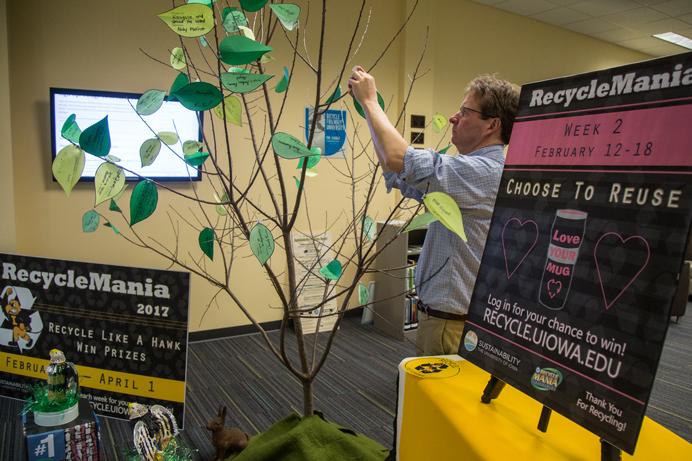By Charles Peckman
In the past two months, 29 garbage trucks’ worth of waste have been diverted from the landfill on the University of Iowa campus.
Throughout a nationwide competition to reduce waste, called Recyclemania, the UI averaged 45 percent waste diversion, which resulted in approximately 446,428 pounds of recycled material.
Recyclemania took place on campuses from the University of Miami to the UI from Feb. 5 to April 1.
UI recycling coordinator Beth Mackenzie said the 446,428 pounds is equivalent to the carbon emissions of 135 passenger vehicles being driven for a year.
The UI was also able to compost approximately 137,847 pounds of material such as food waste and napkins.
Universities across the country compete to see who can alleviate the most amount of garbage from landfills, while educating students, staff, and faculty about sustainable waste.
“I would say we did well,” Mackenzie said. “We didn’t fall from previous years and stayed pretty steady throughout. We had a big first week and even jumped to the front of the Big Ten.”
Data from this year’s competition were collected by Mackenzie and the Office of Sustainability.
During the first week of the competition, the UI topped the Big Ten but then fell to second place — a position the UI kept until the seventh week.
Although the national results of the competition will not be released until April 17, Mackenzie said she suspects the UI will end up second in the Big Ten and anywhere from 10th to 40th nationally.
She also said 1,200 people participated in online recycling-related activities throughout the course of the event.
During Recyclemania, Mackenzie said, events such as the pledge drive, reusable mug giveaway, food waste audit at Hillcrest, and “Caught Green Handed” helped raise awareness for composting, recycling, and sustainable practices.
George McCrory, a communications specialist with the Sustainability Office, said he thought Recyclemania was a success.
“I think we had very good engagement — we had events such as the ‘Caught Green Handed,’ which I was a part of that really promoted recycling,” McCrory said. “It was important to establish recycling education. It was also really good to see former participants in the events coming back and participating this year.”
Sara Maples, the interim director of the Sustainability Office, said there are preventative measures that can be taught to those who are not acclimated to recycling.
“The best way to not have waste is to not create it,” Maples said.
Recyclemania helps push the UI toward a 60 percent waste diversion level, she said, which aligns with the UI’s 2020 sustainability targets.
“We’re thinking big — a lot of the events we hosted targeted everyday behavior,” Maples said. “[Recyclemania] is an important education tool.”
Overall, Mackenzie said, there is still much to be learned about recycling, but she is positive.
“When everyone is working together, we can make a big difference,” she said. “We have to continue to build on that.”



